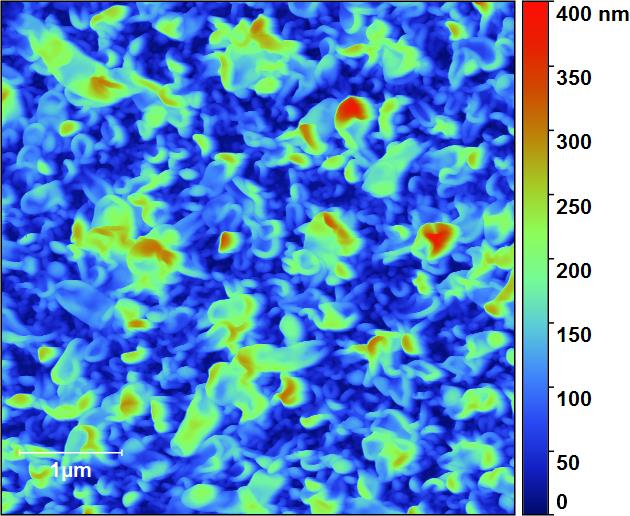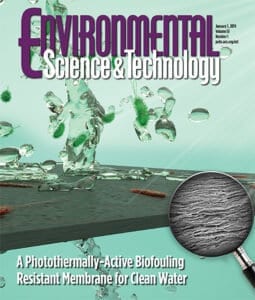
Scientists have developed an ultra-thin, super-strong membrane to filter liquids and gases, with the potential to cut energy consumption in industry.
They found that the crumpled membrane could separate substances 400 times faster than the conventional membrane.
Membranes are selectively permeable barriers that can provide a filter for a range of processes, from removing salt from sea water in desalination plants, to filtering the blood of kidney patients in dialysis machines. Filtration processes using membranes could potentially reduce energy consumption compared to other separation methods.
However, many industries use evaporation and distillation techniques rather than membranes, because membranes can be costly to scale up and they are not resistant to the organic solvents used in many industrial refining and chemical processes.
Now, researchers from Imperial College London have developed a prototype crumpled membrane that has the potential to be used widely across industry. The prototype is extremely thin – it would take a stack of ten thousand membranes to match the diameter of a human hair – making it very permeable. It is also strong, and is able to filter organic liquids at pressures of around 50 bar, which is the equivalent to the pressure at around 500 metres below the ocean’s surface. The membrane is durable and resistant in a range of organic solvents.
In a study detailed in the journal Science, the team created a membrane with nanoscale crumples and established that this provides an increased surface area for filtering substances that remains strong and does not buckle, even under extreme pressures. The prototype is 80 millimetres in diameter, but the team is confident that it can be scaled up to industrial areas.
Ultimately, the researchers believe that their prototype membrane could be used to improve or completely replace industrial processes that process organic solvents, which currently rely on evaporation and distillation techniques. Approximately 30 per cent of the world’s energy is currently used by industry, with a substantial fraction of that being used in evaporation and distillation processes. These industries could potentially make major energy savings if they used the membranes, with consequent reductions in carbon dioxide emissions.
Professor Andrew Livingston, co-author of the study from the Department of Chemical Engineering at Imperial College London, said: “Membranes are currently used for a range of important tasks such as making water drinkable and life-saving kidney filtering. The drawback has been that industry hasn’t been able to use membranes in organic liquid systems more widely because they’ve had cost and design limitations. Our research suggests that we can overcome these challenges, which could make these membranes useful for industries ranging from pharmaceutical companies to oil refining. The energy and environmental benefits could be massive.”
Dr Santanu Karan, co-author also from the Department of Chemical Engineering at Imperial College London, added: “I am really excited about this research breakthrough. We now want to work even more closely with industry to further refine our membranes so that they can meet their needs. We hope our work will lead to new collaborations and ultimately, improvements in the way industries use separation processes.”
To test the effectiveness of the membrane in the lab, they team mixed together a solution containing a solvent, alcohol, and dyed molecules of different colours and sizes. They then made the solution percolate through the membrane at high pressures, using a device called a dead-end cell, to see if they could filter out everything apart from the alcohol. The team observed the process using an absorption spectroscopy device, which uses light at different wavelengths to determine what molecules are passing through the membrane. They determined that the membrane was completely effective, with only the alcohol passing through.
The researchers then compared the crumpled membrane to a conventional membrane, carrying out the same experiment. Their aim was to determine how fast their membrane could purify and concentrate the solution compared to the conventional model. They found that the crumpled membrane could separate substances 400 times faster than the conventional membrane.
Read more: ‘Crumpled’ filter has potential to slash energy consumption in industry
The Latest on: Energy consumption in industry
[google_news title=”” keyword=”Energy consumption in industry” num_posts=”10″ blurb_length=”0″ show_thumb=”left”]
via Google News
The Latest on: Energy consumption in industry
- Coal lawyer: Quick court action essential to keeping EPA rules from killing industryon May 3, 2024 at 1:44 pm
An attorney for the Wyoming-supported Energy Policy Network says a court injunction is critical to keep coal plants open and prove carbon capture technology.
- Nuclear energy continues to help power N.Y. grid as renewables lagon May 3, 2024 at 7:05 am
The state's climate law mandates that it reach 70 percent renewable sources for the electrical grid by 2030. Nuclear energy will not contribute to that goal.
- How Can Data Centers Prioritize Energy Efficiency? Learn More At Bisnow’s May 21-23 DICE East Eventon May 2, 2024 at 9:57 am
If that’s the case, they’d have to look at that from a cost and energy consumption standpoint. Bisnow: What do you look forward to most about attending this year’s DICE East event? Brubaker: The ...
- Can AI find a way to reduce the broadcast industry’s energy consumption?on May 2, 2024 at 7:04 am
OpenDrives' Trevor Morgan asks if AI has the answer to making data centres for the media and entertainment industry more sustainable ...
- ExxonMobil’s Transition Is Grounded In Facts About The New Energy Mixon May 2, 2024 at 4:31 am
The petrochemical industry uses petroleum as a feedstock ... in the production of advanced plastics and products that help manufacturers reduce energy use, emissions, and waste. One key development in ...
- Homeowners say this clean energy industry has dirty secreton May 1, 2024 at 2:22 pm
The homeowners interviewed all have different solar companies and faced different issues, but all were left in the dark for months or even years about problems plaguing their systems.
- Court ruling big for energy industryon April 30, 2024 at 5:00 pm
The Odessa American is the leading source of local news, information, entertainment and sports for the Permian Basin.
- Decarbonizing the Power Industry with Low-Carbon-Intensity Hydrogenon April 30, 2024 at 5:00 pm
While these renewable energy sources will play a key role in the future power ... hydrogen is here to stay. Regardless of the end-use industry, there is a supply mode and application to fit your ...
- Commentary: Data center growth demands focus on energy efficiencyon April 30, 2024 at 2:14 pm
Data center energy use and the related environmental impact can be mitigated in part by a stepped-up push for power generation from renewable sources.
- Best HVAC Systems 2024: Energy Efficiency and Cost Savingson April 30, 2024 at 8:16 am
Cost Efficiency: Advanced HVAC systems are more energy-efficient, which significantly lowers electricity bills. Automated adjustments and smart thermostats avoid unnecessary energy use, making these ...
via Bing News










